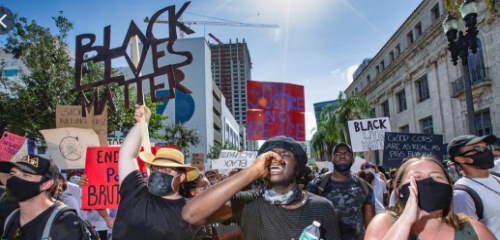[George Floyd\White Privilege]
Floyd’s killing in Minneapolis, captured in witness videos showing then-Officer Derek Chauvin kneeling on Floyd’s neck, has led white Americans to call out racism against Black Americans more vigorously than at any moment in recent memory.
Photo: YouTube
George Floyd’s murder seems to have struck a chord with many whites now protesting against racial policing.
Mike Sexton is white and a Republican who lives in an affluent suburb of Fort Worth, where many neighbors back President Trump and some work in law enforcement. Rage wells up in his voice as he says that George Floyd, a Black man, was “basically lynched.”
Shawn Ashmore is an independent who lives nearby in east Dallas. He’s using Floyd’s killing to teach his young sons uncomfortable lessons about the privileges their family enjoys because they’re white — how, for instance, they’ll never fear for their lives during an encounter with the police the way some Black men do.
Lisa Joakimides lives in rural Northern California and considers herself a well-meaning Democrat. After the election of Barack Obama in 2008, Joakimides, who is white, convinced herself that America was finally making amends for its history of mistreating Black people.
As Joakimides got down on both knees to honor Floyd at a roadside demonstration in early June, she wondered how she could have been so naive.
Floyd’s killing in Minneapolis, captured in witness videos showing then-Officer Derek Chauvin kneeling on Floyd’s neck, has led white Americans to call out racism against Black Americans more vigorously than at any moment in recent memory. And it’s prompting many white people to think more deeply about the color of their own skin.
Why now?
Chicago-based sociology professor Jacqueline Battalora believes that after three wearying months of social isolation and economic upheaval brought on by the COVID-19 pandemic, Floyd’s killing was yet another blow to the illusions of safety, security and equality that many white people harbor about America.
“The police are fair; institutions are fair — white people have been so happy to believe those things,” said Battalora, a former police officer and author of “Birth of a White Nation: The Invention of White People and Its Relevance Today.” “What this signals is that a good chunk of white people now have some recognition that something’s not right.”
For Sexton, Ashmore, and Joakimides, the killing of Floyd and outpourings of rage have forced them to see that expressions of sympathy and displays of solidarity with Black people are only the beginning. America won’t change its racist ways, they say, unless white people use this period of protest and reflection to change, too.
What’s different this time, Sexton said, is that white people have gained a better sense of where that outrage comes from, and how insulated they are from the racial injustices that provoke it.
Sexton, 45, said he can’t sit on the sidelines of the protest movement, or shy away from the national conversation about racism and police brutality, simply because he votes red instead of blue.
“It’s not right versus left,” he said. “It’s right versus wrong.”
Sexton said he wasn’t oblivious to racial discrimination. Every Black person he knows has shared stories of being followed and stopped for no reason by police.
But the video of Floyd’s killing, which captured him crying out “I can’t breathe” and calling out for his dead mother, made Sexton realize the powerlessness and sheer panic that Black people often experience in the presence of officers.
He said it’s crazy that it took so long for him and other white people to fully grasp that horror of police brutality, “but for us, we wouldn’t have understood were it not for the video.”
“Now,” he said, “we’re listening.”
Sexton, a salesman, recently organized a rally for police accountability in a high school parking lot near where he lives in Grapevine, Texas. It drew about 200 demonstrators, most of them white.
Members of the clergy and Grapevine Police Chief Mike Hamlin attended. One of the speakers was a Trump supporter.
A Black teen told the crowd that she was afraid to bring children into the world because she feared she wouldn’t be able to protect them from law enforcement or the country’s racism.
“That broke my heart into a thousand pieces,” Sexton said.
After weeks of protest, opinions about police violence appear to be shifting, but there’s still a large gap between white and Black people about whether it represents a national crisis.
In an AP-NORC poll taken in mid-June, fewer than half of white respondents — 39% — believe that police violence against the public is either an extreme or very serious problem, compared with 80% of Black respondents.
Those numbers did show a shrinking of the gulf between the way white and Black Americans view the issue. The same poll was taken in the early stages of the Black Lives Matter movement in 2015, and then only 19% of white people said police violence was an extreme or serious problem, compared with 73% of Black people.
For the rest of this story log on to: https://news.yahoo.com/something-not-george-floyd-protests-130034792.html?.tsrc=daily_mail&uh_test=1_02












